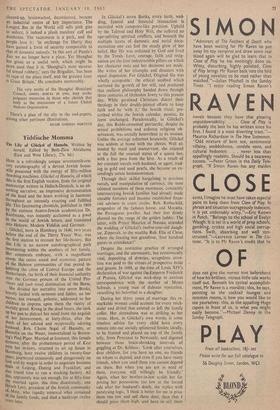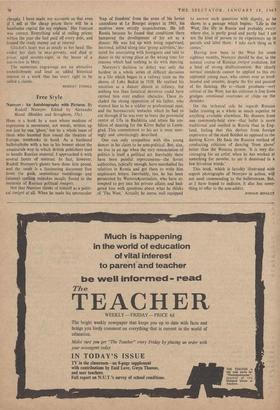Yiddische Momma
The Life of Gliickel of Hameln. Written by herself. Edited by Beth-Zion Abrahams. (East and West Library, 27s. 6d.)
HERE is a refreshingly unique seventeenth-cen- tury autobiography of a devout Jewish house- wife possessed With the energy of fifty-million threshing machines. Gliickel of Hameln, of which this is the first English version, from the original manuscript written in Jildisch-Deutsch, is an ab- sorbing narrative; an impressive demonstration of the head and the heart working in harmony throughout an intensely exacting and fulfilled life. This fascinating chronicle, published in 1869, by the eminent Austro-Jewish academician Dr. Kaufmann, was instantly acclaimed as a jewel in the world of Jewish letters, and translated into Hebrew, Modern Yiddish and German. Gltickel, born in Hamburg in 1646, two years before the end of the Thirty Years' War, was the first matron to recount her life-history. But this Life is no narrow autobiographical path meandering within the oonfines of her family. Her comments embrace, with a magnificent sweep, the entire social and economic pattern of the Hebrew communities of that period in- habiting the cities of Central Europe and the Netherlands, the birth of their financial authority over the German princes of the United Pro- vinces a,nd (sub rasa) .domination of the Borse. She divided her narrative into seven Books, heavily larded with sermons and fables; an im- mense, but tranquil, polemic, addressed to her children to impress upon them the vanity of Worldly greed. Rising in the dead hours, she took UP her pen to distract her mind from the anguish of her bereavement, at forty-three, after the death of her adored and reciprocally adoring husband, Reb. Chaim Segal of Hameln, or -Ilamelin on the Weser, immortalised in Brown- ing's Pied Piper. Married at fourteen, this female dynamo, after the probationary period of Kest with her in-laws, returned to set up house in Hamburg, bore twelve children in twenty-four Y,ears, journeyed extensively and dangerously on (°°t and by wagon in order to negotiate business deals in Leipzig, Danzig and Frankfurt, and also found time to run a stocking factory. All this, apparently was not enough, for at fifty-four s,,,he married again, this time disastrously, one Levy, president of the Jewish community 4 Metz, who iapidly annexed what remained Of the family funds, and died a bankrupt twelve Years later.
In Gliickel's seven Books, every birth, wed- ding, funeral and financial transaction is recorded with computer-like precision. Upheld by the Talmud and Holy Writ, she suffered no ego-splitting spiritual conflicts, and beneath the multiple layers of domestic and social docu- mentation one can feel the steady glow of her belief. Her life was ordained by God and lived by the Torah. Love, courage, faith and resig- nation are the four indestructible pillars on which her character rests and her decisions are made. She writes of her triumphs and disasters with equal dispassion. For Gltickel, Original Sin was wholly acceptable: the ethical seedbed which nurtured the growth of her will, and produced that resilient philosophy handed down through three centuries of Orthodox Jewry to this present day. While go-ahead Christians distort their theology in their double-jointed efforts to keep faith and be 'with it,' the Jewish ritual, pre- scribed within the Jewish calendar, persists, its form unchanged. Paradoxically, in Gliickel's day, this Rabbi-cemented patriarchy, despite its sexual prohibitions and arduous religious ob- servances, was socially benevolent to its women. Unlike the average suburban housewife, Gliickel was seldom at home with the chores. Well at- tended by maid and manservant, she enjoyed to the full the unusual status of a queen bee, with a free pass from the hive. As a result of her constant travels with husband, or agent, trad- ing in gold and seed pearls, she became an ex- ceedingly astute businesswoman.
Through their skilful bargaining in precious metals, and manipulation of currency, the most talented members of these enormous, constantly intermarrying Jewish families had already made sizeable fortunes and become established finan- cial advisers in court circles. Reb. Rothschild, progenitor of the faMous house, and Mocatta, the Portuguese jeweller, had their feet firmly planted on the rungs of the golden ladder. The latter, with Prince Maurice of Nassau, attended the wedding of Gliickel's twelve-year-old daugh- ter, Zipporah, to the wealthy Reb. 'Elia of Cleve, where the feasting was grandiose, 'four hundred
guests in attendance!' - Despite the restrictive practice of arranged marriages, and the unromantic, but economically vital, depositing of dowries, scrupulous atten- tion was paid to the virtues of prospective bride and groom. In 1688, at the time of Louis XIV's declaration of war against tlw Emperor Frederick of Prussia, Gltickel was neck-deep in anxious correspondence with the mother of Moses Schwab, a young man of dubious reputation, cancelling his betrothal to a daughter.
During her thirty years of marriage this re- markable woman could account for every reich- staler and drittel that entered or left the family coffer. Her shrewdness was as striking as her virtue. Here, in Gliickel's own words, is some timeless advice for every child born every minute into our socially splintered Sixties; ideally, to be framed and placed on top of the family telly, from Penzance to Newcastle, and digested between those brain-shrinking intervals of goggling at Dr. Kildare: 'Look after yourselves, dear children, for you-have no one, no friends on wh9m to depend, and even if you have many friends, when you need them you cannot depend on them. But when you are not in need of them, everyone will willingly be friendly.' Again, when her brother-in-law scolds her for pricing her possessions too low at the forced sale after her husband's death, she replies with paralysing logic, 'I think it better for me to price them too low and sell them dear, than that I should price them high, and have to sell them cheaply. I have made my accounts so that even if I sell at the cheap prices there will be a handsome capital for my orphans.' Her forecast was correct. Everything sold at ceiling prices; within the year she had paid off every debt, and loaned the ready money out at interest.
Glackel's heart was as steady as her head. She ended her days in near-poverty, and died at peace, aged seventy-eight, in the house of a son-in-law in Metz.
The numerous engravings are an attractive embellishment and lend an added historical interest to a work that has every right to be called a classic.
BRIDGET TISDALL































 Previous page
Previous page